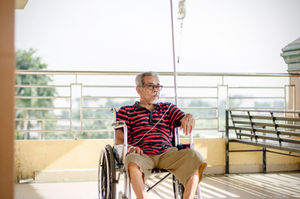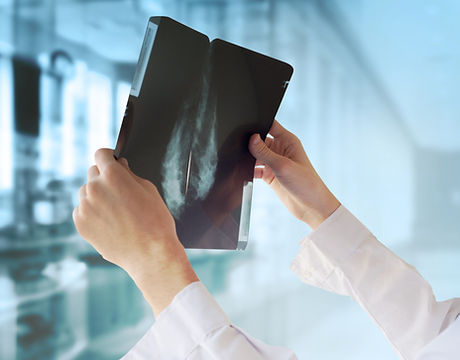Stem Cell Therapy for COPD & Emphysema
- Nov 14, 2020
- 5 min read
More frequently patients are asking me “What do you think about Stem Cell Therapy for my COPD?” Some are even bringing in pamphlets from US based clinics touting that they can treat anything from COPD to ALS. They are often clearly very hopeful that I am going to site updated research showing positive research trials or at the very least support their interest in contacting these for-profit clinics.

Stem cells are sometimes called the body's master cells, as they develop into blood, brain, bones and organs and have the potential to repair, restore, replace and regenerate cells. We believe these cells can be used to someday treat many medical conditions and diseases. Stem cell research is booming and we all have high hopes, but the FDA has not approved any stem cell-based products for use as treatments other than blood-forming stem cells derived from umbilical cord blood according to the US Food and Drug Administration website.
“So, if not FDA approved, how are these US based clinics in business?” is the question I invariably hear after I tell them this. It essentially comes down to a technicality in how they are obtaining the stem cells and manipulating them as well as how they claim this as a surgical procedure instead of medical treatment. I agree, very sketchy.
In the U.S., the FDA says, "stem cells, like other medical products that are intended to treat, cure, or prevent disease, generally require FDA approval before they can be marketed."
However, treatments may avoid FDA regulation if the stem cells:
Came from your body
Aren't being tweaked to make tissue they don't normally make
Are only "minimally manipulated"
These clinics argue that transplantation of the patients own stem cells is a surgical procedure rather than drug/biological treatment. Therefore, licensed doctors can perform such transplants if they deem it medically appropriate for a patient.
“So, okay if it’s my stem cells that they are using how is it not safe?” That is a bit harder to answer because while your own stem cells would seem likely to be safe there are other risks to consider. First, we don’t know that reinjecting stem cells into your bloodstream is appropriate hoping that they will repair/regenerate injured tissue that needs it and not cause any harmful growth. Patients are assuming that lab protocols are being followed and vigorous microbiological contamination control is established. And of course, there is the surgical procedure itself requiring anesthesia and liposuction to obtain the fat cells and harvest the patients stem cells for use. It is rare too that patients understand that this is not a permanent solution. Often patients receiving stem cell treatment therapy require multiple treatments at the cost of thousands of dollars. I have heard of as little as seventeen thousand dollars up to twenty-seven thousand from patients for a single treatment.
This is a confusing time for patients who are chronically quite ill and desperate for a fix to their progressive disease. Some stem cell clinics are capitalizing on patients hopes and promising the moon. Some of these so-called clinics are touting that they can treat anything from COPD, Multiple Sclerosis, ALS (Lou Gehrig's disease), Parkinson’s Disease and on and on. That is not to say, however, that stem cell research is not making headway because it is. There is real research ongoing and we have high hopes for the future for all these disease states. but when patients hear about the hopes and progress made in stem cell therapy from the press and then get offers for treatment for the disease that their doctor is saying may be able to be managed but not cured, it’s hard to blame them for wanting to believe. They are thinking, these companies are "on to something" that just might help them and maybe in time that will be true. A lot of companies are claiming they can do things right now however that the science simply can't support.
The problem is when the question of can I get stem cell treatment is being answered with a strong yes from these for profit clinics but the question of should I get treatment is not being meaningfully addressed. To this point, the FDA is stepping up its inspections of U.S. stem cell clinics and defending its actions in federal court. However, people can still find doctors and clinics in the U.S. who offer unproven stem-cell treatments. If you Google stem cell treatment and just about any disease, you will find an option for therapy somewhere; most of which is currently outside of the United States however.
The FDA filed two federal complaints seeking to permanently ban two clinics from marketing stem cell products without regulatory approval and accusing them of "significant deviations" from good manufacturing practice requirements. Permanent injunctions are sought for US Stem Cell Clinic LLC of Sunrise, Florida, and California Stem Cell Treatment Center Inc., which includes the Cell Surgical Network Corp., in Rancho Mirage and Beverly Hills.
According to the FDA complaints, manufacturing violations could impact the sterility of products used at both companies, placing patients at risk for developing infections. The complaint also sited US Stem Cell Clinic as refusing to allow FDA investigators entry, except by appointment, and denied access to employees, which is illegal.
So how are we to direct patients who are desperate for something different to try when they have tried everything else and transplant is not an option? It is a bit of a gray area when patients are insistent on going forward with consultation at one of these clinics. I usually tell these patients that I would like to be supportive, but the science just doesn’t have robust enough data to give favorable recommendation at the current time. I express to them that these clinics are using patient testimonials as their mainstay support for efficacy and that subjective data is just that. I know however that some of my patients will go ahead with consultation anyway, so I refer them to The International Society for Stem Cell Research (ISSCR) handbook on stem cell therapies.
The ISSCR advises patients to seek only stem cell treatments being tested in clinical trials approved by the FDA (or, if abroad, by a national regulatory agency such as the European Medicines Agency). It also allows for smaller studies approved by an independent Institutional Review Board (IRB) or Ethics Review Board (ERB).
The ISSCR lists these warning signs that a stem cell treatment is not legitimate:
It makes claims based on patient testimonials.
The same stem cells are used to treat multiple diseases.
The source of the stem cells is not clearly documented.
How the treatment will be done is not clearly documented in a "protocol" that serves as the medical practitioner's operating manual for the procedure.
Claims there is no risk. All medical procedures carry some risk.
High cost or hidden costs. Legitimate clinical trials don't charge patients. Some even pay them to participate.
For a direct link to the
ISSCR Stem Cell Therapy Handbook click link below or copy into web address.
http://www.closerlookatstemcells.org/docs/default-source/patient-resources/isscr-patient-handbook-english_ltr_17nov2016_web-only.pdf?sfvrsn=2









2 Comments